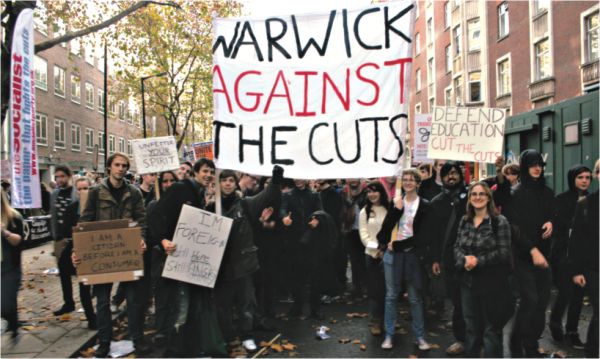Student Rights
Students' Union: The right of students
Soraya Auer
Digby Jacks, president of the UK's National Union of Students (NUS) in the early 1970s, once said “Students' unions are there to protect, defend and extend the rights of students.” His words are still being reiterated by Students' Union presidents across the world today.
“It is at the very heart and basis of every single students' union in the UK at least,” says Leo P Boe, the current Students' Union President at Warwick University. “It's an active process to make sure that the government and university institutions are delivering for students based on the concerns students are telling them about.”
In Bangladesh, however, not only has such a students' union not existed since the 1990s, the term 'students' union' now has a very different meaning altogether.
 |
Warwick University's Students' Union, along with hundreds of other Students' Unions in the UK, have participated in peaceful protests over the past 18 months against the Governments plans to cut university funding. Courtesy:Warwick Students' Union |
“The words have a very bad taste to them because people here think of all the political parties that recruit first year students right off the bat,” explains Barshan Quadry, President of King's University College Students' Council in Ontario, Canada.
“You have all these political parties with their own youth wings, representing their own agendas. Not every political party's policies affect students and yet students are on the streets for them all. In the west, it is agreed that for a student body to legitimately represent its students, it needs to be nonpartisan.”
Quadry, a Bangladeshi national, adds, “By not being politically affiliated, we focus solely on the interests of students and advocate for their rights as students, not as civilians.”
Bangladeshi students, though, have historically played a significant role in shaping their country's politics. The Language Movement of 1952, the Mass Upsurge of 1969, the War of Liberation of 1971 and the anti-Autocracy Movement of 1990 are all instances in history where students demonstrated they could stand together and fight for a cause.
Jannatul Ferdowsh, an international relations student at Dhaka University, suggests students today do not unite under one cause. She says, “The form of politics being practiced on campuses is only serving the narrow interest of the mainstream political parties who perceive their student factions as mercenaries.
“I think sadly due to the absence of a proper Students' Union, no suitable channel exists for students to state their concerns and demand their rights. Though students have come to the streets from time to time to protest on certain issues and voice out their demands, it is not always the right way to accomplish something.”
Dhaka University, the country's largest public university, and Chittagong University were both subject to some controversy last month over errors in their admission tests. A multiple-choice exam paper set by Dhaka University was failed by all the students who sat it. It was only after students complained about the dubious remarking of the paper that the matter was taken to the High Court of Bangladesh. There it was discovered that the answers to the multiple choice questions were actually incorrect, so no one stood a chance of passing.
“If a legitimate Students' Union existed at either of those universities,” explains Warwick SU president Leo, “they could have called them out on it and got the government involved faster than they might have as individuals. The SU would've been responsible on behalf of those students of ensuring a response and then either fixing the immediate problem or lobbying the university to change the inefficient system that allowed that mistake to be made in the first place”.
Universities in the USA, Canada, Australia, Europe and elsewhere are legally required to have a nonpartisan Students' Union. They are run by full-time elected officers who used to be students. Most have buildings separated from those belonging to the university, though still on campus. There students have food, drink and entertainment facilities as well as support services that give advice and guidance in counselling, healthcare and housing. Leo says, “SUs are there to provide the 'university experience' where students pick up skills, develop their interests and actually meet people things a university would never be able to afford do on its own, let alone put on, because all these are student-run, student-led.”
Despite Dhaka University not having a Students' Union, Jannatul, a student of international relations, believes she is still getting the real university experience. She says, “DU provides me with a platform where I get introduced to a large number of people who boast diverse perspectives. As I interact and share my ideas with them on different issues, it helps me to enrich my knowledge and widen my horizon.”
So in a country known for prioritising education and strong student activism, how have students allowed their rights as a student be neglected and controlled by party politics?
“I think the private universities can set an example,” suggests Barshan. “They have the power not to be run by politics so if they were to encourage a single nonpartisan student body to be established, it would help them improve their students' experiences beyond the classroom.”
Since the 1990s, students have not united under one cause and student protests have been synonymous with violence. By giving issues a voice, like that of students being recruited, one can hope students will soon consider their own rights as a student a cause worth fighting for more.
| 